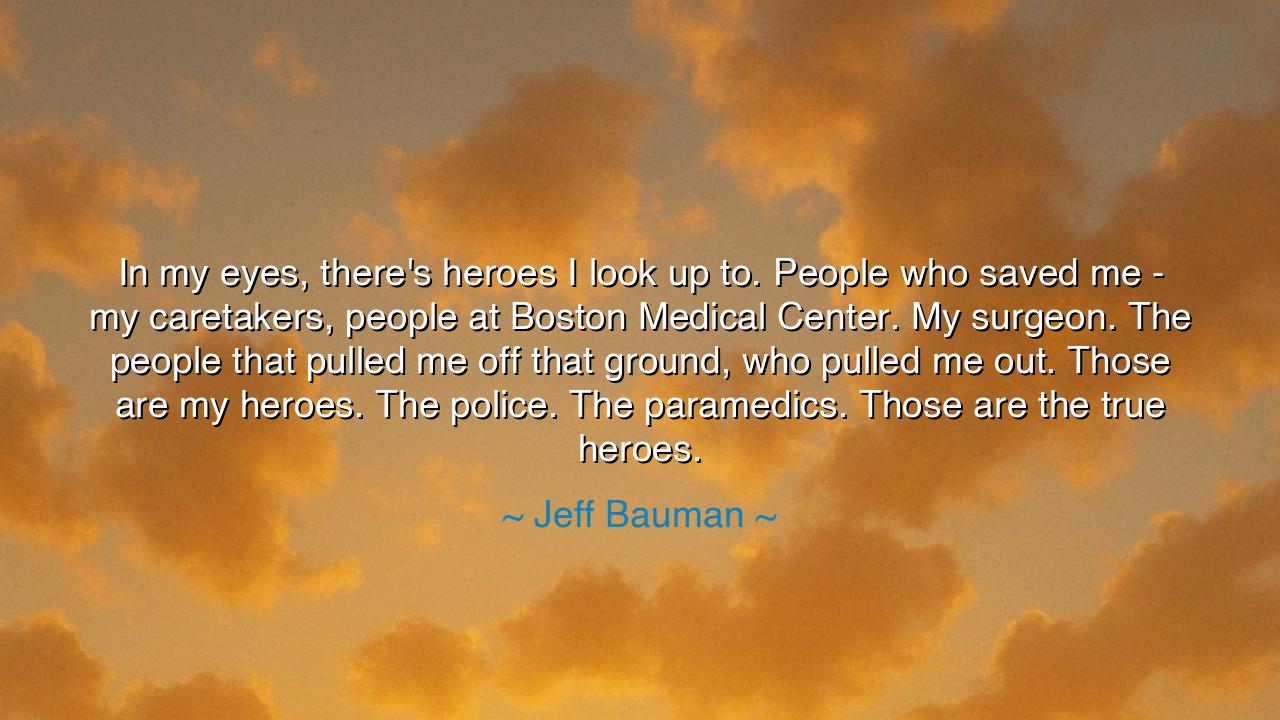
In my eyes, there's heroes I look up to. People who saved me - my
In my eyes, there's heroes I look up to. People who saved me - my caretakers, people at Boston Medical Center. My surgeon. The people that pulled me off that ground, who pulled me out. Those are my heroes. The police. The paramedics. Those are the true heroes.






“In my eyes, there’s heroes I look up to. People who saved me — my caretakers, people at Boston Medical Center. My surgeon. The people that pulled me off that ground, who pulled me out. Those are my heroes. The police. The paramedics. Those are the true heroes.”
Thus spoke Jeff Bauman, survivor of the 2013 Boston Marathon bombing, whose life was torn apart by violence and yet transformed by compassion. His words are not the cry of a victim, but the song of a man reborn — a voice of humility, gratitude, and reverence for those who serve without expectation of fame. In a world that often confuses heroism with glory, Bauman restores the word to its ancient meaning: courage in service of others, the strength to protect and to heal when all seems lost.
The origin of this quote lies in the darkest of moments. On April 15, 2013, as the Boston Marathon reached its jubilant climax, two explosions shattered the peace. Chaos erupted. Smoke clouded the streets. Among the fallen lay Jeff Bauman, gravely injured, his legs destroyed by the blast. Yet amidst the horror, the light of humanity shone — strangers rushed forward to save him. First responders, medics, and ordinary citizens risked their lives to pull survivors from the wreckage. Bauman was carried to safety by rescuers whose faces would forever be etched into the nation’s memory. Later, at Boston Medical Center, surgeons fought to keep him alive, and caregivers tended to him through the long road of recovery. From that crucible of pain emerged this statement of profound wisdom and gratitude.
When Bauman calls these men and women “the true heroes,” he redefines heroism not as the pursuit of recognition, but as the quiet act of sacrifice. His words remind us that real valor is often unseen — it lives in the hands that lift the fallen, in the hearts that remain calm amid chaos. In ancient times, the Greeks celebrated heroes like Achilles and Hector, warriors who won their honor through combat. Yet Bauman’s heroes are of a different kind — healers and helpers, not destroyers; those who rush toward danger not to conquer, but to save. In this reversal, he restores a higher truth: that the truest strength lies not in domination, but in compassion.
Consider the story of Florence Nightingale, the “Lady with the Lamp,” who walked among the dying soldiers of the Crimean War. She carried no weapon, no armor — only light, courage, and care. Her hands healed where swords had wounded; her presence brought hope where war had brought despair. In her, as in Bauman’s rescuers, we see the eternal archetype of the servant-hero — one who finds greatness not in power, but in love. Such people do not wait for applause. They answer the call of suffering instinctively, as if their hearts were attuned to the music of mercy itself.
Bauman’s reflection also carries a deeper moral truth: that no one stands alone in their hour of need. His survival was not his doing alone, but the sum of many hands and hearts. He honors the interdependence that binds all humanity — the sacred truth that strength is shared, and that salvation is often found through others. In a culture that prizes independence and fame, his humility is a mirror to our age. He teaches us to look beyond the self, to honor the quiet labor of those who keep the world standing: the nurses, the medics, the police, the firefighters, the unseen guardians who carry the weight of human suffering without complaint.
In his gratitude lies a lesson for all generations. When calamity strikes, the measure of a society is not in its wealth or monuments, but in the compassion of its people. The paramedic kneeling in blood, the surgeon bent over a shattered body, the caregiver sitting through the long night — these are the pillars upon which civilization stands. To revere them, as Bauman does, is to revere the divine spark within humanity itself. His words call us not merely to admire heroes, but to become them — to live each day with readiness to serve, to lift another from the ground when they fall.
So, my listener, take this truth into your heart: heroism is born not in glory, but in goodness. The world’s true heroes are those who choose compassion when fear commands retreat. They are the ones who, like the first responders at Boston, hear the cry of suffering and answer, “Here I am.” Let us honor them not with words alone, but by following their example — by becoming hands of healing, voices of calm, and hearts of courage wherever life calls us. For as Jeff Bauman reminds us, the greatest among us are not those who are celebrated, but those who save — quietly, bravely, and without end.






AAdministratorAdministrator
Welcome, honored guests. Please leave a comment, we will respond soon